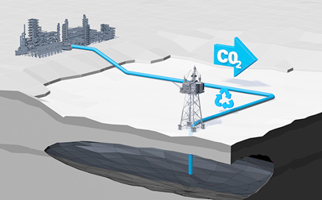The need to cut greenhouse gas emissions and limit climate change is clear. The UK government has pledged to reduce emissions to net zero by 2050 and the Climate Change Committee has insisted that we must act very quickly to meet that target.
The OGA recently published the UK Continental Shelf (UKCS) Energy Integration report which showed that integrating offshore energy systems – oil and gas, renewables, hydrogen and Carbon Capture and Storage (CCS) – could deliver around 30% of the carbon reduction needed to meet the UK’s net zero target.
The study went on to say that electrification alone could reduce UKCS oil and gas power generation emissions by one third of today’s levels by 2030, which will be critical to maintain the oil and gas industry’s social licence to operate.
To achieve that vision, the industry, working with government, must deliver a minimum of two operational electrification projects on the UKCS by the mid-2020s.
To play our part in meeting that challenge, the OGA are changing our Strategy to drive industry to deliver net zero, with an increased focus on specific areas such as Central North Sea (CNS) platform electrification.
CNS electrification workshops
Over the summer we hosted two workshops; the first brought together Operators and the power sector and invited them to submit potential electrification concepts. The workshop created significant interest with over 60 attendees, and we are now studying the several concepts received to ensure the OGA is well informed and can provide effective guidance and support.
The second workshop involved Operators and potential lenders and investors and once again over 60 attendees joined the session with equally impressive engagement.
We are now aware of initial feasibility assessments by groups of oil and gas operators, with renewable power developers and infrastructure companies. These engagements are welcome and could lead to project proposals and the OGA will support industry in identifying solutions that are aligned with Maximising Economic Recovery and Net Zero objectives. With this collaborative approach, the OGA do not plan to present an optimal solution(s) for CNS platform electrification.
As this initiative progresses, we see our role as:
- Raising awareness of the collective need for electrification that individual operators are not able to show, and facilitate having enough scale to have a viable scheme
- Raising awareness of the prize for wider stakeholders
- Actively encouraging industry to approach us with potential schemes to help us understand enablers and barriers and where the OGA can support
- Ensuring we are an informed regulator to enable us to influence and test proposed schemes such that maximum value and emissions reduction is achieved
- Coordinating with our peer regulators to work enablers and break down barriers, for example with Marine Scotland and Crown Estate Scotland we are mapping out the consenting roadmaps for a wind farm in a ScotWind zone or in closer proximity to platforms that would enable the scheme to be operational by 2025.
New skills to meet new challenges
We live in a changing landscape in which existing players must learn new skills and how to work in different ways. Innovative projects require the participation of stakeholders who may be new to the North Sea and who may not have worked together before.
We will continue our work and plan to hold a supply chain workshop early in 2021 to raise awareness of the opportunity and continue to support Operators in the CNS, West of Shetland, and increasingly in the Southern North Sea and East Irish Sea.
In parallel we will liaise with our peer regulators using real life examples to establish the supporting regulatory regime. A robust regulatory regime is essential, but we all agree that regulation should not stand in the way of progress and will work together to remove barriers where possible. We are working to clarify regulatory pathways, considering options for enhanced coordination to expedite projects, and are exploring measures to encourage investment in electrification such as those raised by industry on energy pricing and tariffs.
We will not allow the pace to drop.
This is a steep learning curve for everyone involved; but we are encouraged by the enthusiasm of all the groups we have encountered and convinced that the skills, experience and commitment of the oil and gas industry, renewables industry, investors, regulators and government will lead to successful projects. We encourage operators and other stakeholders to continue approaching us with ideas, enablers and barriers, so we can support industry in achieving the vision of 2 electrification schemes in operation by the mid 2020’s.


